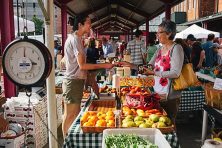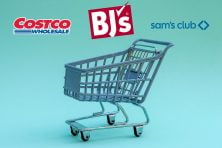How Savvy Shoppers Cut Costs At Farmers Markets

Farmers markets feel like magic—sunshine, fresh produce, the smell of herbs, maybe even someone strumming a banjo near the beets. But let’s be real: it’s easy to overspend while vibing with the zucchinis. Here’s how clever buyers score the best stuff without draining their wallets or their reusable totes.
Shop Late For Deep Discounts

Prices drop fast as the market winds down because vendors prefer selling low over packing leftovers. As a result, hard-to-store produce becomes a bargain. Many throw in extras just to clear tables. Some even ask what you’re willing to pay—seriously. Show up an hour before closing and watch the deals roll in.
More From The Penny Hoarder: The Dumbest Things We Keep Spending Too Much Money On
Buy In Bulk For Bigger Savings

Buying more often means paying less per pound. Most stallholders love moving large quantities and may toss in extra items unprompted. Big orders get remembered—sometimes rewarded, and they’re ideal for freezing or splitting with neighbors. The more you buy, the more favors you earn. Just ask about bulk deals and see how much you can save.
Make money easier. Sign up for The Penny Hoarder’s newsletter today.
Bring Cash And Small Bills

Cash still talks at farmers markets. People often give a better price for cash, especially if it saves them card fees. Small bills prevent awkward overcharges when change runs low, and near-exact amounts may trigger friendly discounts. Don’t count on digital payments at the market, as cash helps you stay within budget and opens doors to savings.
More From The Penny Hoarder: Best Cash Back Rewards Credit Cards to Earn Money While You Spend in 2025
Talk To The Farmers

Conversations pay off. Regulars who chat with vendors often hear about deals before signs go up. Returning customers build trust and sometimes get big discounts. Asking about origin and seasonality ensures you buy smart, as most sellers appreciate this kind of curiosity. A simple chat could provide access to deals no one else knows about.
More From The Penny Hoarder: The Best Rewards Credit Cards to Maximize Your Spending in 2025
Stick To A Meal Plan

Meal planning slashes unnecessary spending. A list helps skip flashy impulse buys and keeps your budget intact. It also means fewer forgotten greens rotting in the fridge. Vendors like direct shoppers, and they’ll sometimes offer a deal if you’re shopping with purpose. Know what you need, and you’ll save from the start.
More From The Penny Hoarder: Our Picks for The Best Bank Promotions This Month
Compare Prices Before Buying

One bunch of carrots could cost twice as much just a few stalls down, so take a full walk before buying anything. It usually takes under 10 minutes, but you might spot the best prices and maybe catch early markdowns. Savvy customers know the first stall isn’t always the best deal. Scan, then spend.
More From The Penny Hoarder: Budgeting 101: How to Budget Money
Buy Ugly Produce

Not all produce needs to be pretty. Imperfect fruits and vegetables pack the same nutrition at a fraction of the cost. Market traders often pre-bag “seconds” at deep discounts just to move them. Buying ugly also cuts food waste and supports sustainable habits. Smart shoppers know beauty isn’t always a bargain.
More From The Penny Hoarder: Ditch Overpriced Car Insurance Now — Save $500 Today
Shop In Bad Weather

Rain scares off the crowds but not the deals. With fewer buyers around, vendors become more flexible on price because no one wants produce to spoil in the rain. Discounts often pop up on the spot. Some sellers even reward brave shoppers with “weather warrior” perks as they also want to go home. Bring an umbrella and leave with bargains.
More From The Penny Hoarder: 5 Strategies to Consolidate Your Credit Card Debt
Look For Bundle Deals

Remember that bundles offer variety and value in one go. Stallholders love selling mixed boxes to clear stock fast, and they pass the savings on. These curated deals often cost far less than buying piece by piece. You’ll try things you never planned to, and that surprise might just become a new favorite.
More From The Penny Hoarder: What is Debt Settlement and How Does it Work?
Buy In-Season Only

Nature’s calendar is the best price guide and seasonal shopping is smart shopping. When harvests are peaking, prices drop and freshness soars. Out-of-season items often come from far away, which means higher costs and less flavor. Stick to what’s local and ripe now. It tastes better, costs less and supports your nearby growers.
More From The Penny Hoarder: Ditch Overpriced Car Insurance Now — Save $500 Today
Bring Your Own Bags And Containers

Always come prepared with your own bags and watch the savings add up. Sellers at the market will appreciate your dedication to sustainability, and it also cuts their packaging costs—a win for both sides. Plus, your own bags are sturdier and more comfortable to carry around. It’s a small habit with a big payoff for a better planet.
More From The Penny Hoarder: Here’s How to Start Saving Money — Even If You Don’t Have Room in Your Budget
Split Large Quantities With Friends

Let your trip to the market be a fun experience. Buying bulk with friends and neighbors allows you to split costs and avoid spoilage. You’ll access more variety at cheaper prices, and finally, try those pricey items without the guilt. It’s a social win, too: food shopping will be a mini outing that supports the community.
More From The Penny Hoarder: The 28 Best Side Hustles: Our Top Picks to Help You Make More Money
Avoid Pre-Packaged Produce

Skip the pre-packed trays and head for the bins. Loose items cost less per pound and let you pick the freshest ones. Pre-packaging hides bruises or mold that you definitely want to avoid, and there’s less plastic to deal with. Moreover, you’ll pick exactly the items you prefer.
More From The Penny Hoarder: 17 Make-Your-Own-Schedule Jobs You Can Do From Home
Follow Farmers’ Markets On Social Media

Many farmers markets share limited-time deals, early bird perks and loyalty rewards online. Social media posts also help you plan visits when discounts are hot. Staying connected means staying ahead, as a quick follow could land you a coupon or an inside track on next week’s market steals.
More From The Penny Hoarder: How to Choose a Credit Card That is Right For You
Use What You Buy Fully

Make every part of your shopping experience count. Carrot tops and broccoli stems are edible and packed with nutrients. Scraps you don’t eat can still power soups or enrich compost. Learn how to store produce right and stretch its shelf life. Every bit you use saves money and keeps food out of the trash.
More From The Penny Hoarder:












